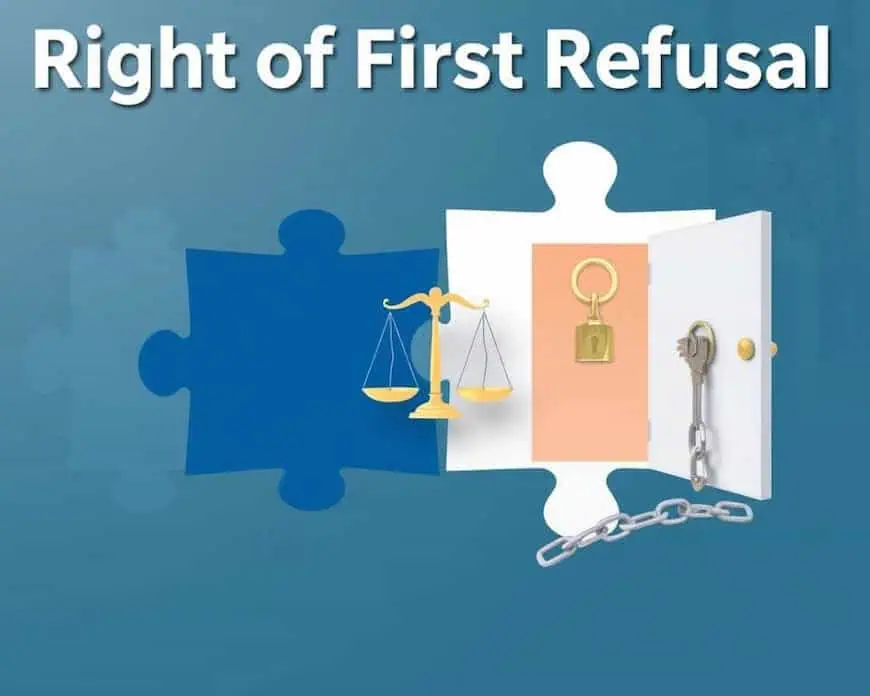Right of first refusal is a legal concept that plays a significant role in real estate, business, and work contracts. We will explain what it is, how to use it, and its key components. You’ll also learn how it compares to other rights and the pros and cons for both sides.

Main Points
- A right of first refusal is a legal agreement. It entitles one party to buy or lease a piece of property or asset before any other person can.
- It is very common in real estate, business, and jobs. It protects the holder’s interests.
- The three major components of a right of first refusal are the trigger event, the terms, and the time to act.
- It differs from the options and rights of the first offer. Both are different about obligation and who might instigate the process.
- Buyers and sellers should consider the advantages and disadvantages of a right of first refusal before making a decision.
What is a Right of First Refusal?
First refusal is a type of agreement wherein one is allowed to match or better any other offer over a property. It is very common in real estate, business deals, and jobs. It is a security for the person having this right.
Meaning and Description
First refusal is the right to have the first opportunity to buy any property or asset. Refusal prohibits the owner from selling to someone else. The buyer gets the same deal as any other offers.
Common Use Cases
- The meaning of right of first refusal is evident in many places, such as:
- Real estate transaction: Tenants might get to buy the property they rent if the landlord sells.
- Mergers and Acquisitions: A company may allow other companies to attempt to match a competitor’s offer before selling.
- Employment contracts: Important employees may have the chance to buy the company or their shares if it is sold.
- The right of first refusal will help a person or business in a complex transaction to hold their rights.

Essential Ingredients of a Right of First Refusal
It is important to understand the elements of the right of first refusal and its components. This legal agreement has several key parts. These parts ensure that the agreement is strong and protects the holder’s interests.
It means that very first it has to be clearly stated what asset or property is involved it land, business, or ideas. Coming in as equally important is the time frame in which such rights are to be utilized.
The another important aspect involves time and manner of exercise of that sort of right, including stating the event triggering that right, an offer from someone else, and how to accept that offer and complete the transaction.
To make the first right of refusal functional, the agreement needs to delve into the consequences whenever it is violated. This may be through lawsuits or monetary penalties. Understanding these key components helps in constructing an effective right of first refusal for the parties involved.
| Key Elements of a Right of First Refusal | Description |
|---|---|
| Specific Asset or Property Covered | The asset or property that is subject to the right of first refusal, such as real estate, a business interest, or intellectual property. |
| Duration of the Right | The time frame during which the holder of the right can exercise it, often specified in terms of years or until a certain event occurs. |
| Conditions for Exercising the Right | The trigger events, such as a third-party offer, that allow the holder to exercise the right, and the process for matching the offer. |
| Consequences for Non-Compliance | The legal or financial penalties that may be imposed if the party with the right of first refusal is not honored. |
People can tell that it is a good agreement by understanding the parts of the right of first refusal. It will keep their interests in safety in many business deals and agreements.

Right of First Refusal along with Other Similar Rights
First refusal is one of the more common and standard kinds of contract rights. First refusal has to be compared with related rights, such as a right of first offer and negotiation. Each right has its specific characteristics, and this can affect just how a deal is consummated. This is an important consideration when you make a contract.
Special Characteristics
There are a couple of key differences between a right of first refusal and other rights, mainly in regard to the timing and manner of an offer. A right of first refusal simply entitles the holder with the ability to match any offer the owner receives where a right of first offer entitles the holder to make the first offer. A right of first negotiation enables the holder to discuss with the owner the sale of the property before the owner sells it to anyone else.
This might really alter how a deal is done and what ultimately happens. Basically, understanding the details of each right can enable you to make good choices and will also mean that your interests are taken care of.
First refusal is a potent right, but great caution needs to be exercised in its application in order to avoid some undesirable consequences. How it differs from related rights will also help you navigate through some of the hurdles involved in contract negotiation.
First refusal right is a very important concept to understand if one works with real estate, mergers, or any sort of deal in business. How it differs from other kinds of rights will help in making decisions which would be advantageous to the business: perform at the best possible scale.
Right of First Refusal in Business Transactions
First refusal is a substantial right in business, particularly within real estate and mergers. This can alter the outcomes of negotiations:
First Refusal Right in Real Estate
In real estate, this right allows a tenant, neighbor, or partner to accept an offer before the property is sold to someone else. This right gives them a chance to buy the property first, usually at the same price. This proves to be helpful for those tenants who want to stay or neighbors who want to manage area development.
Right of First Refusal in Mergers and Acquisitions
In mergers and acquisitions, it protects minority shareholders or joint venture partners. It lets them match any third-party offer, keeping them involved in the deal. This is vital for those who’ve invested in the business but don’t control it.
Understanding how a right of first refusal works is important in real estate and mergers. It helps a business to cover its interests and stay competitive in the business arena.
Advantages and Disadvantages of Right of First Refusal
First refusal has some advantages: the holder may keep control of the asset or property, match a competing offer, and understand what will happen with the asset. It is helpful in real estate or mergers that keep the holder’s interests safe.
On the other hand, there exist disadvantages, too. Sometimes, it makes the deal slower or even more difficult. It also restricts the owner’s choice to sell. It could even cause conflicts of interest since the holder’s goals may not go in tune with everyone else.
To understand the trade-offs, let’s dive deeper into the benefits and drawbacks:
- More control of the asset or property.
- Can match a competitive offer and might be able to buy the asset.
- Gives some confidence about what will happen to the asset in the future.
- Can protect the interests of the party with the right in cases involving real estate transactions or mergers and acquisitions.
- Can slow down or make a transaction more difficult, which is frustrating to the owner or other people involved.
- Reduces the flexibility of the owner to sell the asset.
- This can create potential conflicts of interest, since the party holding the right of first refusal may have different incentives than the owner or other stakeholders. Deciding whether to give or keep a right of first refusal requires careful thinking.
Think about the good and bad sides. Understanding these trade-offs helps use the right of first refusal in a smart way, helping everyone involved.
Right of First Refusal in Employment Contracts
It is important in the busy work world: right of first refusal. Legally, it forms part of the contract where employers will be accorded the ability to match any job offer an employee may receive, thus keeping the team together and saving the company investment by way of workers.
Keeping Company Safe
If there is a right of first refusal and a worker happens to get a job offer from a competitor, his present employer can counter the offer. In other words, perhaps that worker won’t leave after all-that’s great for the company because it retains talented staff. It works both ways.
This clause is very helpful for companies that have invested a lot in the training and development of their staff. Retention of such employees enables the company to continue reaping from the knowledge and skills acquired. Good industrial relationships are also maintained.
This right of first refusal signifies that the company values its workers. That the boss is ready to meet any other job offers that might be extended to keep them. Such actions improve the workplace, enabling people to work better.
First refusal in job contracts is a powerful tool that aids firms in retaining their investment in their workers and ensures continuity of their operations.
Conclusion
The right of first refusal is a complex legal concept with broad ramifications that may impact many deals and contracts. Understanding its elements, how it is applied, and its relative benefits and detriments empowers individuals and businesses to make prudent choices and decisions that serve their best interests. Knowing the right of first refusal is important in real estate, merger, and job cases.
Considering its details, managing these situations carefully would contribute to the protection of your rights and goals. The summary of the right of first refusal and key takeaways in respect of the right of first refusal from this article thus provide a sound basis for tackling this aspect of the law. You’ll be confident in regard to the subsequent deal or contract negotiation. You will be able to appreciate how the right of the first refusal works as a safety on your interests.
FAQ
A right of first refusal lets one offer or better any given offer when the property is about to be sold. It is very common in real estate, in business dealings, and even in offering jobs. It does protect the interest of the person with this right.
A right of first refusal is not the same as other rights, such as first offer or negotiation. Each one affects deals differently. Knowing those differences is important when a contract is to be made.
A right of first refusal has some important parts. These include what is being offered, how long the right lasts, and the rules for matching offers. Understanding these helps ensure the right works as it should.
In property selling, it is the right given to a lessee, neighbor, or partner to match any offers prior to sale. This keeps their interest safe and allows them to purchase the property.
This right has the following advantages: more control and the possibility of comparing offers. On the other hand, this can delay sales, reduce the proprietor’s liberty, and give rise to disputes.
In jobs, this right lets employers match outside offers to keep employees. It helps protect the company’s investment and ensures continuity.











